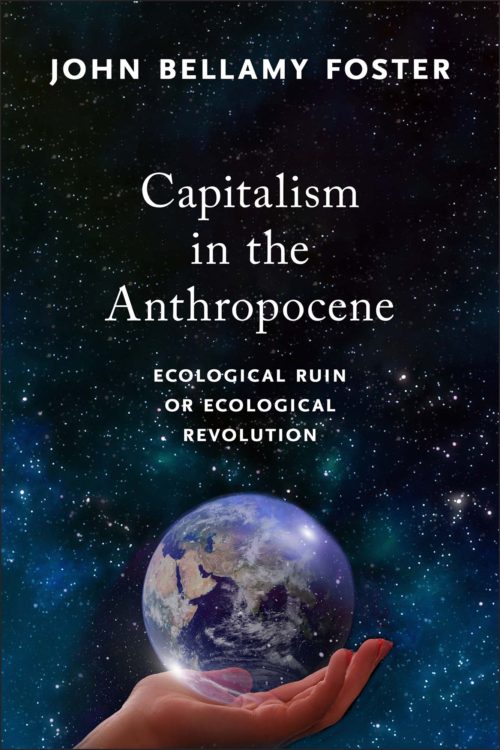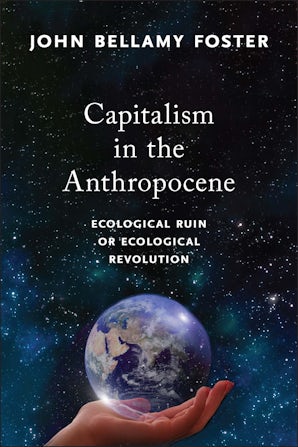For anyone concerned with the fate of the planet (Capitalism in the Anthropocene reviewed in ‘International Affairs’)
Capitalism in the Anthropocene: Ecological ruin or ecological revolution
By John Bellamy Foster
576 pages / $29 paper / 978-1-58367-975-3
Reviewed by Ning Zhang, Lanzhou University, for International Affairs
As a leading figure, John Bellamy Foster has long been committed to studying environmental issues, ecological Marxism, capitalism and the relationship between the three. If Marx’s Ecology (New York: Monthly Review Press, 2000) is the starting-point of his ecological research, then Capitalism in the Anthropocene is a systematic summary of his decades-long work. This book is an important contribution to the literature on eco-socialism that will benefit anyone working on environmental issues. In it, Foster explores the causal relationship between capitalist accumulation, environmental crises and the significance of Karl Marx’s concept of a metabolic rift as a theory of ecological crisis. Marx believed that the capitalist mode of production disrupts the spontaneous yet complex dynamic between humanity (labour) and nature. This disruption creates an unbridgeable rift between these two worlds, which leads to an imbalance in the material and energy cycles of human society and the rest of nature. The result is the environmental degradation and the accompanying crisis that the world is grappling with.
The book is divided into three parts. First, Foster analyses the origin of the contemporary ecological crisis from the perspective of Marxist ecology. The author concludes that capital accumulation, under the current stage of monopoly- finance capital, is the real threat to the global environment. In addition, Foster uses a wide range of data and examples to detail the negative impact of fossil fuels. Here, the author criticizes the current market-based remedies, such as carbon markets and geoengineering, as unable to improve the accelerating environmental crisis. Foster argues that unless the proposed solutions can also change the capitalist accumulation system, they will fail to tackle the planet’s crisis (p. 68). As he puts it, ‘system change, not climate change’ should be the right framework (p. 74).
In the second part of the book, Foster explores various historical debates on environmental issues and examines the two schools of thought that have emerged out of these debates. One is the ecological school, which opposes the anthropocentrism that began with Francis Bacon in the 1960s; and the other is the eco-socialist school, which insists on the existence of a dialectical relationship between society and nature. Marx’s work on the relationship between humanity and nature, especially his metabolic rift theory, underscores his role as a pioneer of eco-socialism. Foster also focuses on the environmental thought of Max Weber, Howard T. Odum and others, illustrating the ecological contributions of Marxist theorists and left-wing ecological thinkers after Marx’s death. In addition, Foster discusses the ecological contributions of Friedrich Engels and his influence on subsequent natural scientists, including J. D. Bernal at Birkbeck College, the great biochemist and science historian Joseph Needham and the biologist J. B. S. Haldane.
In the third section, the book turns to the ecological struggles in various regions and explores the potential pathways to sustainable development. Foster discusses the realities of the climate movement and the Green New Deal, of which he is critical since its specific measures do not address the root causes of the problem at hand. Instead, they promote rapid, exponential economic growth or capital accumulation. Once again, Foster believes that only a fundamental change in the logic of value addition can completely heal the metabolic rift.
In the conclusion, Foster criticizes the theory of the end of history. After the collapse of the Soviet Union, humankind did not move towards a better future. Instead, it has faced a series of catastrophic threats, such as economic recession, ecolog- ical crisis and, more recently, the COVID–19 pandemic. All of this undermines the end of history theory and echoes Foster’s imperative to rethink the capitalist system. The author predicts that a new revolutionary wave, aimed at fighting injustice in its many forms—class, racial, gender and environmental—will first appear in the southern hemisphere, and gradually spread, forming a global movement integrating social revolution and ecological revolution. According to Foster, a new set of actors, the environmental proletariat, will drive this historic movement.
The book offers readers a unique perspective for understanding the roots of the current ecological crisis. Readers will find strong evidence of a causal relationship between capital accumulation and environmental degradation. Anyone concerned with the fate of the planet will benefit from reading this book.
Find this review at International Affairs


